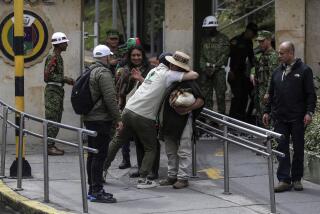Octuplets Critical but Still Hanging On
- Share via
HOUSTON — The tiniest weighs just 10.3 ounces and can fit inside a hand. The largest doesn’t measure up to the littlest of the McCaughey septuplets. But the Chukwu octuplets--the world’s only known living set of eight babies--were hanging on Monday.
All eight children of Nkem and Iyke Chukwu remained in critical condition at Texas Children’s Hospital, a day after seven of them were delivered by Caesarean section. A girl born on Dec. 8 is already breathing on her own and is occasionally being given oxygen.
“She has done very nicely and remarkably well,” said Dr. Patti Savrick, the children’s pediatrician. “The other babies still have that rocky first week to two weeks in front of them.”
Doctors gave most of the babies an 85% chance of survival, although seven were on ventilators.
“I think several have shown some improvement and several haven’t, but it’s too early to say,” said Dr. Leonard Weisman, the hospital’s chief neonatal specialist. “Things just change a lot this early.”
A chief worry was the lung development of the eight babies, who have not yet been named. Baby A was delivered 15 weeks premature. Her two brothers and five sisters who followed early Sunday morning were born 13 weeks early.
The tiniest--Baby E--had doctors holding their breath when an ultrasound after the birth of the first girl revealed the blood flow to Baby E was being restricted by the umbilical cord. The largest--Baby G--weighed 1 pound, 10 ounces.
They all weighed less at birth than the smallest of the McCaughey septuplets, who celebrated their first birthday last month. Those babies, born about nine weeks early, ranged from 2 pounds, 5 ounces to 3 pounds, 4 ounces.
Both sets of babies were conceived after their mothers took fertility drugs.
Dr. Timothy Cooper, a neonatologist and assistant professor of pediatrics and ethics at Baylor College of Medicine, said the 10.3-ounce girl will have a tough fight.
“For that particular baby, it’s probably less than an 85% chance, and she’ll have a higher risk than the larger babies for developing developmental problems,” said Cooper, who described her chances of survival at 65% to 75%.
Few babies as small as the octuplets survive more than a few hours after birth.
Nkem Chukwu, 27, who along with her husband has declined to give interviews, was bedridden at St. Luke’s Episcopal Hospital for 15 weeks to protect herself and her babies. For the last nine weeks, she was on medication to delay delivery as long as possible.
Chukwu underwent surgery Monday morning to stop internal bleeding, the result of drugs taken to forestall labor. Doctors said she was stabilizing.
Chukwu had conceived triplets last year but lost them midway through her pregnancy. The couple has no other children.
More to Read
Sign up for Essential California
The most important California stories and recommendations in your inbox every morning.
You may occasionally receive promotional content from the Los Angeles Times.













